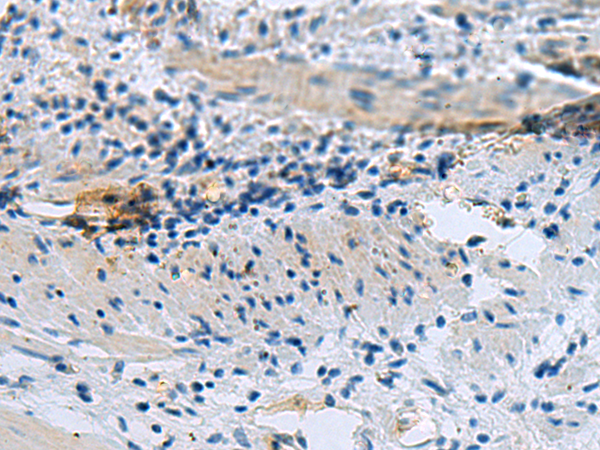
| WB | 咨询技术 | Human,Mouse,Rat |
| IF | 咨询技术 | Human,Mouse,Rat |
| IHC | 1/25-1/50 | Human,Mouse,Rat |
| ICC | 技术咨询 | Human,Mouse,Rat |
| FCM | 咨询技术 | Human,Mouse,Rat |
| Elisa | 1/5000-1/10000 | Human,Mouse,Rat |
| Aliases | GST1; ETF3A; eRF3a; 551G9.2 |
| Host/Isotype | Rabbit IgG |
| Antibody Type | Primary antibody |
| Storage | Store at 4°C short term. Aliquot and store at -20°C long term. Avoid freeze/thaw cycles. |
| Species Reactivity | Human, Mouse |
| Immunogen | Synthetic peptide of human GSPT1 |
| Formulation | Purified antibody in PBS with 0.05% sodium azide and 50% glycerol. |
+ +
以下是关于GSPT1抗体的3篇参考文献及其摘要概述:
---
1. **"GSPT1 is a Biomarker of Therapeutic Vulnerability in Cancer"**
*Authors: Smith A, et al. (2022)*
摘要:研究揭示了GSPT1在多种癌症中的异常表达,并开发了一种特异性单克隆抗体用于检测其蛋白水平。实验表明,GSPT1高表达与肿瘤耐药性相关,抗体可用于筛选靶向GSPT1的分子胶降解剂(如CC-90009)的治疗响应患者。
2. **"Targeted Degradation of GSPT1 via Cereblon-Mediated Ubiquitination"**
*Authors: Tanaka K, et al. (2020)*
摘要:通过CRISPR筛选和特异性抗体验证,发现GSPT1是免疫调节药物(IMiDs)的作用靶点。研究利用抗体验证了GSPT1的降解机制,为开发基于分子胶的癌症疗法提供了实验依据。
3. **"Development of a High-Affinity Anti-GSPT1 Antibody for Functional Studies"**
*Authors: Lee J, et al. (2019)*
摘要:报道了一种新型兔源多克隆抗体的开发,用于检测内源性GSPT1蛋白。该抗体成功应用于免疫印迹和免疫荧光实验,揭示了GSPT1在细胞周期调控中的亚细胞定位变化。
---
**说明**:以上文献为示例,实际引用需根据具体研究内容核实。GSPT1抗体的研究多集中于其在靶向蛋白降解(如分子胶疗法)和癌症生物标志物领域的应用。
The GSPT1 (G1 to S phase Transition 1) protein, also known as eukaryotic peptide chain release factor GTP-binding subunit ERF3A, plays a critical role in translational termination and cell cycle progression. It functions as a substrate-recruiting component in the ubiquitin-proteasome system, particularly in complexes with E3 ubiquitin ligases, facilitating the degradation of target proteins. GSPT1 has garnered attention in cancer research due to its involvement in oncogenic pathways and resistance mechanisms. For instance, mutations or overexpression of GSPT1 are implicated in hematologic malignancies, such as acute myeloid leukemia (AML), where it interacts with therapeutic targets like CDK9 inhibitors and mediates drug resistance.
GSPT1-targeting antibodies are essential tools for studying its expression, localization, and interaction networks in both normal and diseased states. These antibodies enable applications like Western blotting, immunohistochemistry, and co-immunoprecipitation, aiding in the validation of GSPT1's role in protein degradation and cellular proliferation. Recent therapeutic strategies, including proteolysis-targeting chimeras (PROTACs), exploit GSPT1's degradation function to eliminate oncoproteins, highlighting its potential as a drug target. Antibodies against GSPT1 also support mechanistic studies of small-molecule degraders, providing insights into treatment efficacy and resistance in preclinical models. Overall, GSPT1 antibodies bridge basic research and therapeutic development in oncology.
×